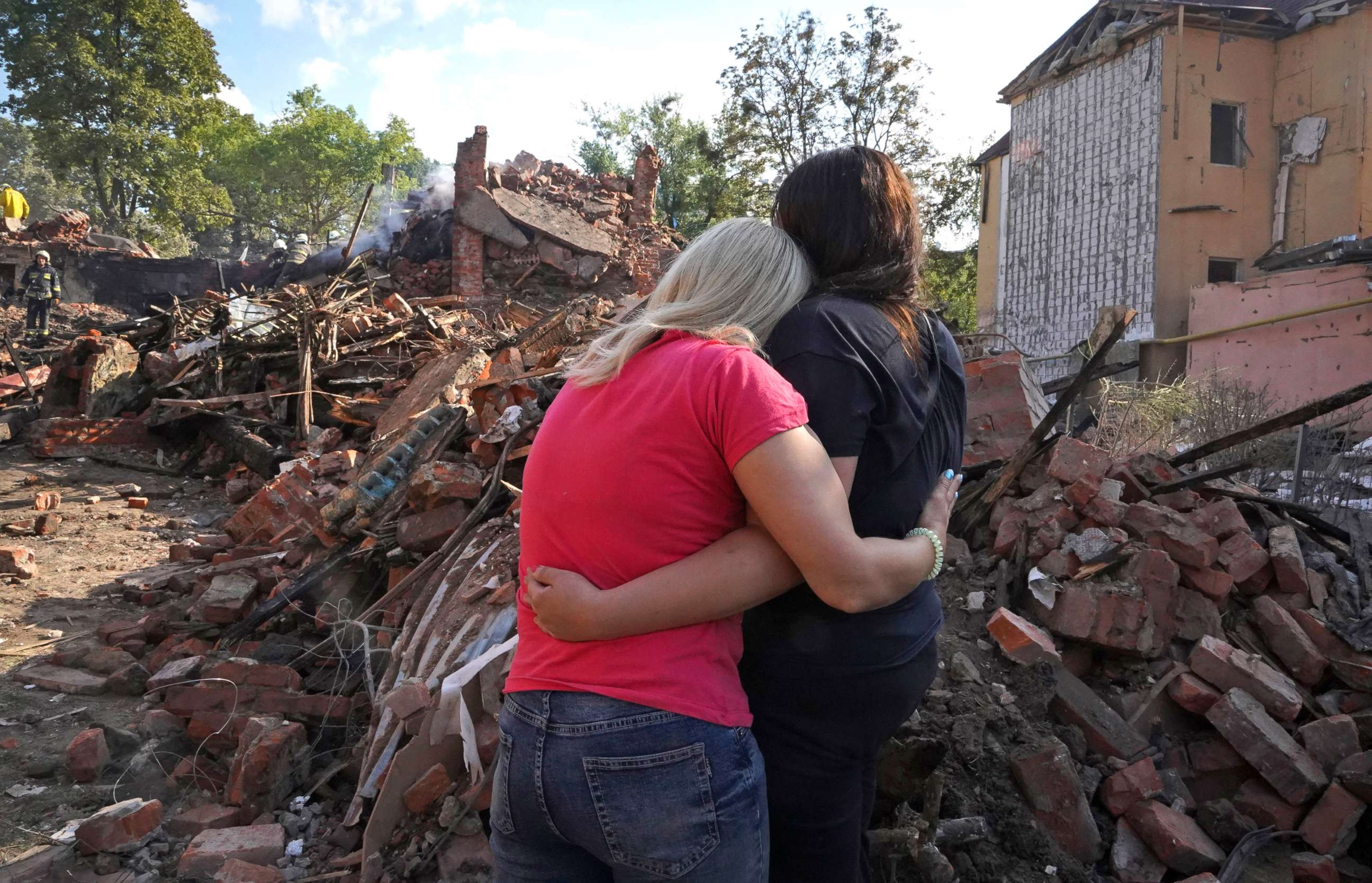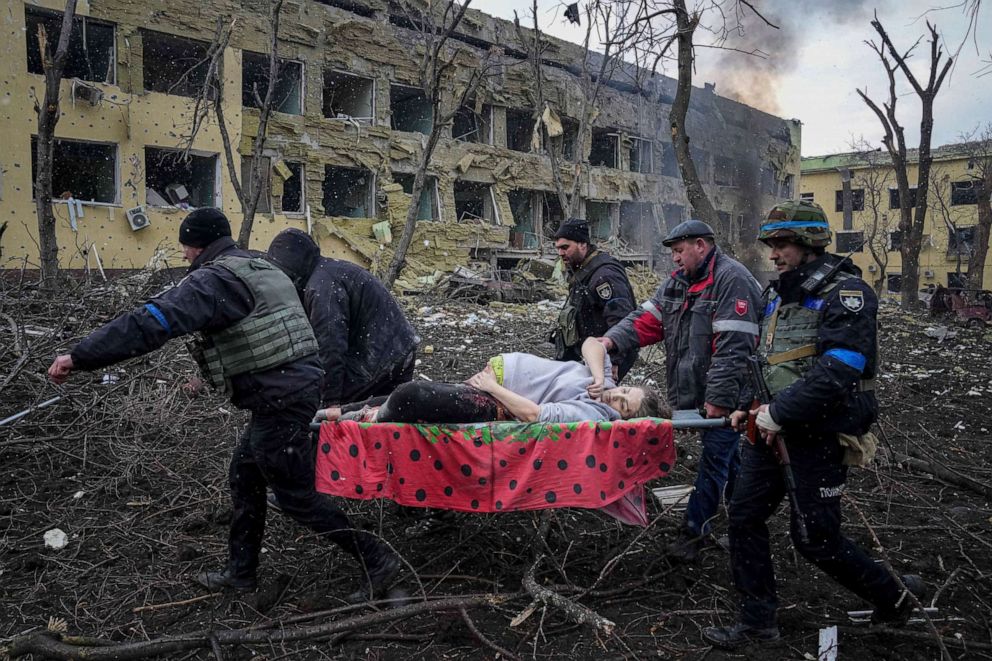How the Russia-Ukraine conflict continues to impact civilians
Thousands of civilians have been killed or wounded since the invasion started.
Six months into Russia's invasion, a humanitarian crisis continues to unfold in Ukraine, as millions have been displaced and thousands killed during the conflict.
With no immediate end in sight to the fighting, humanitarian aid responders are fearful that winter will only bring further suffering for Ukrainian citizens already afflicted by six months of war.
Hundreds of civilians are killed or wounded each week, primarily due to explosive weapons, such as shelling from air strikes and missiles, according to the Office of the United Nations High Commissioner for Human Rights, which has been verifying civilian casualties since the start of the invasion.
“Civilians continue to pay too high a price in this war," the U.N.'s political and peacebuilding chief, Rosemary DiCarlo, said in remarks to the U.N. Security Council in June.

By the U.N's most recent count, as of Aug. 21, there have been over 13,400 verified civilian casualties in Ukraine since Feb. 24, including nearly 1,000 children. So far over 5,500 civilians have been killed and over 7,800 injured, according to the U.N., though those numbers are likely considerably higher.
"There are some black holes," Matilda Bogner, head of the U.N. Human Rights Monitoring Mission in Ukraine, told ABC News. "For example Mariupol, which went through very severe, very heavy hostilities and connections were cut off. For a period of time it was not possible to speak to people there. It was very difficult to get full information."
March has so far seen the highest number of civilian injuries and deaths -- on a "much larger scale" than the most intense fighting after Russian forces invaded eastern Ukraine in 2014, Bogner said. A U.N. report found that from 2014 to 2016, up to 2,000 civilians were killed in Ukraine due to the conflict with Russia.
"While we don't know the full extent, I think we have a fairly clear picture and it means that a lot of civilians are suffering," Bogner said of this latest conflict.
The U.N. has raised concerns that the high number of civilian casualties indicates that Russia is not complying with international humanitarian law.
In one of the deadliest assaults on civilians, hundreds of people who were taking refuge in a theater in the besieged port city of Mariupol were killed in an air strike in March. Amnesty International called the act a "clear war crime" by Russian forces. In Kramatorsk, in eastern Ukraine, dozens were killed in a rocket strike on a train station that was being used for civilian evacuations.

Amnesty International said it has also documented evidence that Russian forces executed civilians in Ukraine in apparent war crimes, which Russia has denied.
Attacks on health care and schools
According to the World Health Organization, there have been 445 attacks related to health care in Ukraine reported between Feb. 24 and Aug. 11 -- including against health facilities, as well as personnel and patients.
Such attacks violate international humanitarian law, which has a higher level of protection for medical establishments, Bogner said. They may have helped contribute to the high number of civilian deaths reported in March, she said, if injured civilians were unable to seek care.

The attacks also prevent people from accessing regular health care, including for chronic conditions, and child vaccinations, Marysia Zapasnik, Ukraine country director for the humanitarian aid organization International Rescue Committee, told ABC News.
"That will have a lasting impact," Zapasnik said. "Their health care system is really overstretched at the moment."
Schools have also been impacted during the war. Ukrainian President Volodymyr Zelenskyy has said more than 2,000 educational institutions in Ukraine, including kindergartens, schools and universities, have been destroyed in Russian air strikes.
September means the beginning of the new school year, though many schools are not in a position to open because they do not have a bomb shelter or they've been damaged, Bogner said.
"One reason why see so many schools attacked is that we have documented armed forces from both sides using schools as bases," Bogner said. "That then means it becomes a legitimate object for the other side to attack. So this is certainly something that we discourage."
Continued stress and anxiety
For Ukrainians, the past six months have been filled with stress and anxiety. "A lot of families' coping mechanisms are being stretched now to breaking points," Zapasnik said.
"There are air raid sirens here on a regular basis," said Zapasnik, who is based in Odesa. "The level of psychosocial stress is quite high across the country, but specifically in the east and south."
Women and children, who are often the most vulnerable in conflict situations, may be in particular need of support, she said.

"Dealing with things such as family separation, death of a loved one, going through a lot of stress, fear, a sense of helplessness," she said.
Families may also be stressed financially, especially if they've lost their livelihood during the war, she said.
Millions of civilians are also without sufficient access to necessities, such as food, water and power sources. As of Aug. 3, UNICEF estimates that nearly 16 million people need humanitarian assistance due to the crisis.
"This continued war in Ukraine is causing extreme civilian harm," Zapasnik said. "Apart from the civilian deaths and injuries ... the war is also leaving millions without sufficient access to food, water, power sources, health care and other essential items."
The International Rescue Committee expects the number of those in need of humanitarian assistance to "increase dramatically" in the winter months, as civilians continue to be displaced and there is no electricity when temperatures plunge, Zapasnik said.
Humanitarian aid organizations are starting to plan for winter now due to challenging supply chain logistics, Zapasnik said, so that they're not caught flatfooted in their response.
"Currently what I'm most concerned about is the winter," Zapasnik said.




